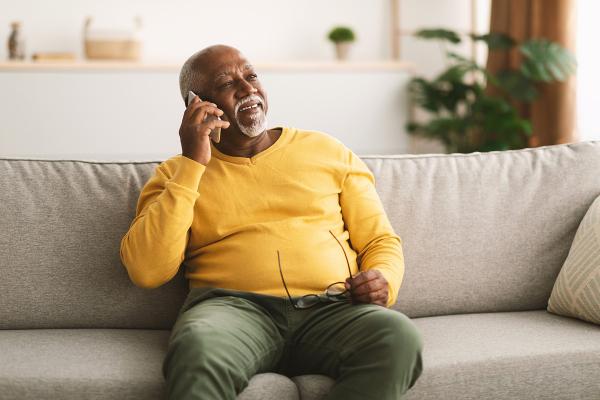
It may be time to get your hearing checked. AARP Hearing Solutions makes it simple. Find a provider today.
Having diabetes could raise the risk of hearing problems. Learn why, plus expert tips to help keep your ears healthy.

Dealing with diabetes? You’re not alone. More than 16 million older Americans have this disease, according to the American Diabetes Association.1
Most people in the United States with diabetes have type 2. It’s a chronic, or long-term, condition that happens when your body can’t control its blood sugar levels.2
Every part of your body needs blood sugar, or glucose, for energy. But when blood sugar levels aren’t well controlled, too much of it stays in the bloodstream. Over time, those high levels of blood sugar damage other parts of the body like the kidneys, the eyes and the heart.2 Diabetes could also affect your hearing.3
There’s a lot to juggle when you have diabetes. Your primary care provider (PCP) will create an action plan to help you track and treat your symptoms and stay on top of regular exams — including an annual hearing check.4
Here’s what to know about the role diabetes plays in hearing. Plus, expert-recommended steps to help keep ears healthy for the long run.

It may be time to get your hearing checked. AARP Hearing Solutions makes it simple. Find a provider today.
“Diabetes is very hard on the body, and so anytime your glucose levels are too high, it causes damage to the blood vessels,” says Kathy McGowan, Au.D. She’s an audiologist at Beltone in Chicago. That includes the tiny blood vessels in your eyes and your ears.
Uncontrolled blood sugar can also affect the way the nerves in ears carry signals to the brain. This is turn may affect how well you hear.3 People with diabetes are twice as likely to develop hearing loss over time.5
And because hearing loss affects balance, people with diabetes have double the risk of falling too.6
That’s why it’s so important to get your hearing checked as soon as you get diagnosed with diabetes, says McGowan.
Staying on top of your diabetes treatment plan — and getting your ears checked regularly — are key habits.
Find a hearing care professional. This is the first thing to do. Ask friends and family if they know of anyone they like and trust. Or check with your PCP. If you belong to AARP®, you can request a no-cost hearing exam and consultation through AARP® Hearing Solutions™ provided by UnitedHealthcare Hearing.
Once you decide on a hearing care professional, consider making them part of your diabetes care team. Here’s why:6, 7
Protect your ears. Loud noises could harm your ears and lead to hearing loss. Protecting your hearing is vital. If you go to concerts or work with power tools, for example, wear ear plugs or earmuffs. And don’t clean your ears with sharp objects or cotton swabs that may damage your ear drum.7
Certain medications could also cause hearing loss. If you are taking a new medication and notice changes to your hearing, let your PCP know.7
Keep blood sugar levels in check. It’s also important to manage your diabetes and blood sugar levels, says McGowan. That includes getting your blood sugar tested regularly. Your PCP will probably suggest lifestyle changes too.
For instance, you may have to tweak your diet so you’re adding more vegetables, fruits and lean proteins to your plate. And get more exercise too.7
The best way to tell if you have hearing loss is through a hearing test and consultation.
But if you’ve been going to yearly tests and notice the following signs between visits, you may want to talk with a hearing care professional sooner.
Here are some signs to look for:3,5
After the hearing exam, your hearing care professional will go over the results with you. If you have hearing loss, they’ll be able to fit you with hearing aids that are right for your situation.5
For example, many people with diabetes also have vision loss, notes McGowan. That’s because high blood sugar levels can affect vision too. If that applies to you, the hearing care professional will be able to suggest devices with larger buttons. This helps make it easier for you to locate them by touch.
Another option McGowan suggests: Hearing aids with a remote control that you carry in your bag or pocket. If you need to adjust anything, you pull out the remote to make changes.
Your hearing care professional will also teach you how to clean your hearing aids. This is important for everyone, but people with diabetes are especially vulnerable to infections, says McGowan.
It’s important to remember that having diabetes is manageable. And with good care and prevention, you can protect your precious hearing too.
Ready to request a hearing exam and consultation? AARP Hearing Solutions has a national network of hearing care professionals. Request an appointment.
Sources
Information is for educational purposes only and is not a substitute for the advice of a licensed medical provider. Consult your provider prior to making changes to your lifestyle or health care routine.
AARP Hearing Solutions is available to all AARP members and does not require a health insurance plan from UnitedHealthcare. The AARP hearing program discount cannot be combined with any other discounts, promotions, coupons or hearing aid benefit plans unless noted herein. Products or services that are reimbursable by federal programs including Medicare and Medicaid are not available on a discounted or complimentary basis. AARP commercial member benefits are provided by third parties, not by AARP or its affiliates. Providers pay a royalty fee to AARP for the use of its intellectual property. These fees are used for the general purposes of AARP. Some provider offers are subject to change and may have restrictions. Please contact the provider directly for details. UnitedHealthcare Hearing is provided through UnitedHealthcare, offered to existing members of certain products underwritten or provided by UnitedHealthcare Insurance Company or its affiliates to provide specific hearing aid discounts. This is not an insurance nor managed care product, and fees or charges for services in excess of those defined in program materials are the member's responsibility. UnitedHealthcare does not endorse nor guarantee hearing aid products/services available through the hearing program. This program may not be available in all states or for all group sizes. Components subject to change.
Network size varies by market.